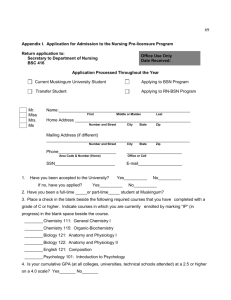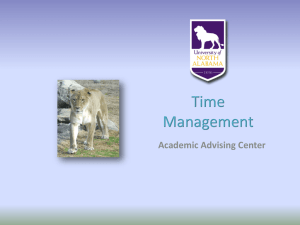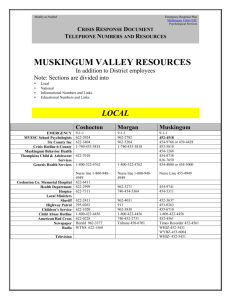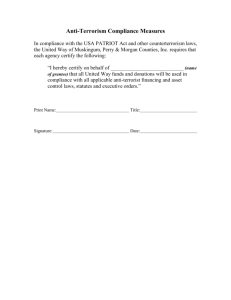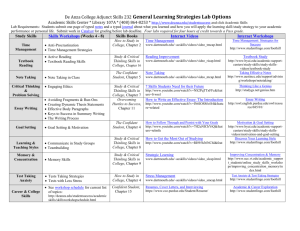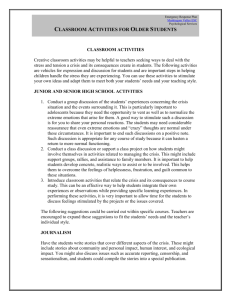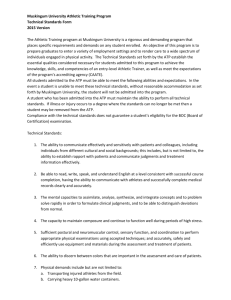Exam Preparation - Mercer University
advertisement
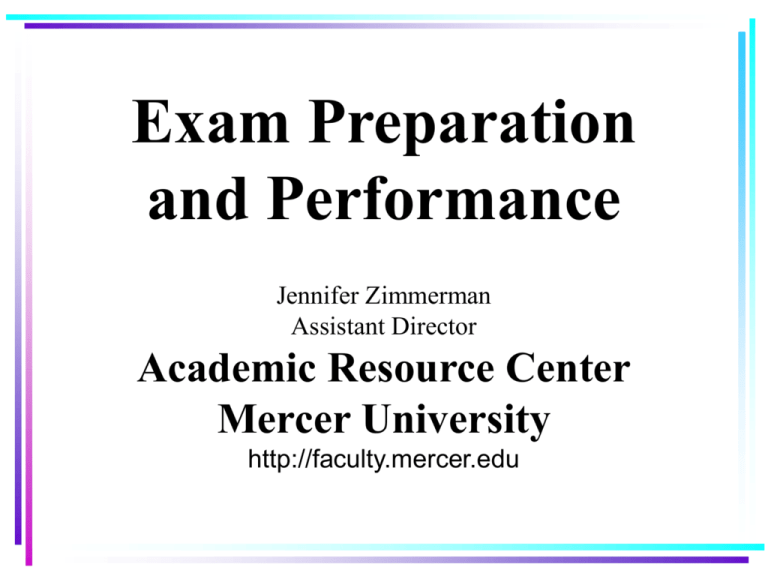
Exam Preparation and Performance Jennifer Zimmerman Assistant Director Academic Resource Center Mercer University http://faculty.mercer.edu When Do You Start Studying for an Exam? On the first day of class! How? Read your syllabus with a fine tooth comb Write in your exam schedule on your semester planner Stay on top of your coursework from that day forward Never Stop Studying for the Exam Do all your work thinking about how you can make it easier to study for your next and final exams Design your notes so that they can easily be reduced into useful study summaries Listen in class so you know exactly what will be on the test Take time to generate questions that will help you recite and reflect on the material to be tested Use Cornell Method Notes and Follow these Study Steps: Record – make notes legible and complete Reduce – write questions, cues, and vocabulary in cue column; prioritize with silver dollar system (Pauk, p. 114) Recite – test self with verbal or written exercises based on cue column and summary Reflect – expand and analyze implications; generate searching questions Review – utilize summary to locate selected topics for repetitive recitation Recitation as a Rehearsal Strategy Steps Read Convert to a question Test Benefits Involved Feedback Motivation Distinctions More than re-reading Cultivates recall over and above simple recognition Create Summary Sheets that: Fold over to display questions and cover up answers (or use index cards) – repetition and recitation Focus on silver dollar prioritizations, summaries, and some cue questions - reduction Relate to questions that are of particular interest to you – reflection Motivation Conceptual organization topical categorical Pauk, p. 355 http://muskingum.edu/~cal/database/Testprepg.html Visual Organizers Use your own words and representations Organize to reduce information to a manageable amount without losing conceptual depth Prepare tools for rehearsal strategies CARDS (Nist & Holschuh, pp. 225-8) Concept maps and charts Compare/contrast charts Flow Charts Time lines Fishbone maps Spider maps Word maps Frayer models Color coded notes http://muskingum.edu/~cal/database/Testprepb.html Memorization Techniques Association – link new information to prior knowledge or experiences Rehearsal – use different learning modalities Relevance – make the information meaningful to your personal beliefs or to a broader understanding of the course Mnemonics – if you are an auditory learner, use songs instead of simple lists or words Clustering – give in to the 7 plus or minus 2 rule and find logical groupings that streamline what you have to memorize Self-testing – practice putting yourself in a testing situation http://muskingum.edu/~cal/database/Testprepb.html Be Prepared to Get the Most Out of a Study Group Legible notes and summary sheets can be shared Pre-defined questions will expedite group study sessions Questions written at the time that material is first learned will be more accurate memory refreshers Comparing questions will allow the group to quickly identify different and/or erroneous interpretations of the subject material Why Study in Groups? Partner testing involves teaching, a more reflective method than recitation Verbal elaboration promotes long term memory retention Explanations require the speaker to understand the topic being discussed Study group partners must expect each other to operate at a high level of thinking Anticipate the Test Find out first: Format – objective or subjective Value and length Time and place it will be given – make-up policy Topic, chapters, and readings covered Focus on class lecture, readings, and/or lab Open-book or closed-book Cheat sheets allowed Special tools allowed or required Who will grade the exam Will partial credit be given Will spelling and grammar mistakes count against grade http://muskingum.edu/~cal/database/Testprepc.html Prepare Deliberately Start studying 3-4 days prior to the test with the following completed Reading Study materials such as summary sheets, concept cards, timelines, etc. List of important concepts that will appear on the test Study plan spelling out how with whom when where Give Yourself a Healthy Edge Relax the night before the exam Do not cram Get at least 6 hours of sleep Get up early (as much as 3-4 hours) the day of the exam Shower, eat breakfast, and take a brisk walk to focus your concentration Review notes, books, and study materials Start the Test on the Right Foot Take a pen, your notes, and books to the testing site so you can study Take your watch if you prefer to use it to track your time When you receive the exam, take a deep breath and relax Read, analyze, and follow test instructions Write legibly, use a pen, and leave extra space so that the grader can read your exam easily Approach the Test Carefully Scan the entire test Check content Circle key words and underline important phrases Gauge relative values of questions based on assigned point values Answer questions you are sure of first Only write down answers that are correct so you will return to uncertain questions later Build your confidence and let your memory trigger recall of other information Pace Yourself Calculate how much time you will need to review the test Spend the appropriate amount of time on each question based on point value Move on and finish the test and come back later to questions left unfinished Don’t Give Up on Any Questions Pay attention to interrelated statements and questions that could help you recall information for other questions Answer every question even if you have to guess Guess only after you have answered every question that you can Use common sense in your guesses, but also stay on topic Take a Final Look at Your Work Save enough time at the end of the exam to review your answers Make corrections and additions in the extra space you left around your answers Check that you have understood the questions correctly Check that your answers are accurate and complete Behavior devises plan based on a specific goal breaks tasks down works persistently toward goal Olympic Gold Master Test Medalist Taker e.g. gold medal e.g. “A” on in 100 meter Psych 101 test trains differently at different stages does one thing toward goal each day concentrates on pieces for study does one task for an “A” each day Behavior takes advantage of all opportunities warms up Olympic Gold Master Test Medalist Taker does not miss attends all classes and workouts reviews arrives early and arrives early and runs practice rehearses laps prior to material before workouts, classes, reviews, practices, and and the test the event Behavior identifies weaknesses and takes corrective action learns from the competition (other participants) Olympic Gold Master Test Medalist Taker e.g. stamina e.g. note-taking watches other runners and learns techniques watches other students and learns new study skills Behavior is nervous before big performance maintains health maintains selfesteem Olympic Gold Medalist Master Test Taker recognizes that nervous energy can be channeled into physical energy cares for self mentally as well as physically recognizes that nervous energy can be channeled into mental alertness cares for self physically as well as mentally realizes that winning is not the only thing realizes that grades reflect how one takes tests and do not define the person Evaluating Your Performance What strategies did you use? How much time did you spend studying beyond your normal schedule? When did you begin preparing for the exam? Did you stick to your study plan? Did you earn the grade you were aiming for? Did anything outside of your preparation affect how you performed? Was there anything unexpected on the exam? Do you understand how your exam was graded and how you can improve on the next exam? If you master the material on this exam, will you be adequately prepared on these topics for the final? References Center for Advancment of Learning, Learning Strategies Database. Muskingum College © 1998 <http://muskingum.edu/~cal/database/Database.html> Nist, Sherrie L. and Jodi Patrick Holschuh, Active Learning: Strategies for College Success. Needham Heights: Allyn & Bacon, 2000. Pauk, Walter, How to Study in College. 7th ed. Boston: Houghton Mifflin Company, 2001.
